Solo travel is accompanied with a lot of downtime. Sometimes it can mean being stuck for 3 days in a small Bolivian jungle town waiting for weather improve so that the plane out of there can take off. I read a new book all three days. Other times its while eating out alone to pass the time while waiting. I have read many books in small spurts that way.
I have come to really value books, so much that I make certain to start any new trip with three new books. I already ordered my next three for my upcoming South America trip but maybe you’ll find some of the books listed below interesting. These are some of the books I have read during my travels, though I seem to be missing the dollar store fiction novels I read so quickly in Bolivia!
Out of Captivity: Surviving 1,967 Days in the Colombian Jungle
In Out of Captivity, Gonsalves, Stansell, and Howes recount for the first time their amazing tale of survival, friendship, and, ultimately, rescue, tracing their five and a half years as hostages of the FARC. Their story takes you inside one of the world’s most notorious terrorist organizations, going behind enemy lines with vivid and haunting imagery. Their words conjure a reality that few people have ever encountered—from sleeping on beds literally carved out of the jungle to escaping Colombian military air strikes under the cover of darkness to being bound with steel chains by their captors. Describing backbreaking starvation marches and forced isolation, the authors chronicle their confrontations and interactions with the FARC guerrilla soldiers—a motley crew of brainwashed, idealistic teenagers and seasoned vet-erans who’ve been around long enough to realize that the only way out of the FARC is in a body bag
A Time to Betray: The Astonishing Double Life of a CIA Agent Inside the Revolutionary Guards of Iran
– Reza Kahlili
A true story as exhilarating as a great spy thriller, as turbulent as today’s headlines from the Middle East, A Time to Betray reveals what no other previous CIA operative’s memoir possibly could: the inner workings of the notorious Revolutionary Guards of Iran, as witnessed by an Iranian man inside their ranks who spied for the American government. It is a human story, a chronicle of family and friendships torn apart by a terror-mongering regime, and how the adult choices of three childhood mates during the Islamic Republic yielded divisive and tragic fates. And it is the stunningly courageous account of one man’s decades-long commitment to lead a shocking double life informing on the beloved country of his birth, a place that once offered the promise of freedom and enlightenment—but instead ruled by murderous violence and spirit-crushing oppression.
On The Road, the most famous of Jack Kerouac’s works, is not only the soul of the Beat movement and literature, but one of the most important novels of the century. Like nearly all of Kerouac’s writing, On The Road is thinly fictionalized autobiography, filled with a cast made of Kerouac’s real life friends, lovers, and fellow travelers. Narrated by Sal Paradise, one of Kerouac’s alter-egos, On the Road is a cross-country bohemian odyssey that not only influenced writing in the years since its 1957 publication but penetrated into the deepest levels of American thought and culture.
Going Up the River: Travels in a Prison Nation
– Joseph T. Hallinan
In Going up the River, Hallinan comprehensively chronicles America’s prisons, investigating how prison authority has passed from hard-nosed wardens to the federal court system, a change that simultaneously improved the treatment of prisoners while making inmate rehabilitation and safety more difficult to attain. He also addresses the prison boom: facilities quickly built for economic reasons, resulting in poor prison conditions and a system “so lucrative its founders have become rich men.” This immense financial gain is ironically juxtaposed with the fact that most people view prisons as a terrible waste of money.
– Charles Nicholl
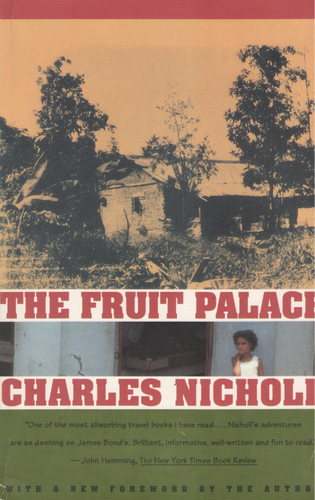
Charles Nicholl is on a quest for “The Great Cocaine Story.” The time is the early eighties and the place…Colombia. The story actually begins twelve years earlier in the tiny, scruffy seaport town of Santa Marta, described by some as “a victim of its privileged geographic location.” “The town had the feel of a tropical smugglers’ den. It was a rakish, seedy, avaricious little place, but somehow exhilarating in the way it lived according to its own laws.” The Fruit Palace, a dismal whitewashed café that legally dispenses tropical fruit juices, has another purpose as the meeting place for a variety of black market activities and the place where Nicholl unwittingly begins his quest.
He returns to Colombia in 1983 “on assignment.” His research is thorough, the risks he takes are serious, and characters he encounters–colorful, cranky and always looking older than their years–are so thoroughly fleshed out, you almost forget you’re reading nonfiction. Nicholl survives dangerous encounters with powerful drug lords, fever, earthquake, solo treks through treacherous jungles–all to deliver this decadent and compelling journey through the cocaine underworld of Colombia.
My Friend the Fanatic: Travels with a Radical Islamist
– Sadanand Dhume
Indonesia is the most populous Islamic country in the world, but Indonesian Islam rests lightly on the nation’s rich mixture of Hindu-Buddhist history and culture. Indian-born Dhume, educated in the United States, worked as a mainstream journalist throughout Southeast Asia before moving to Jakarta, Indonesia, in 2000. Intrigued with the displacement of Indonesia’s tolerant past by the expanding impact of conservative Islam, he traveled to different regions and interviewed a wide range of Islamists to prepare this book, his guide a young editor committed to building an Islamic community reflecting the challenge facing his country. Dhume conveys his frustration with his companion’s mix of kindness and rigidity. He weaves discussion of recent Indonesian history and politics with his confusion over the contrast between the cosmopolitan, hedonist elite and popular culture in Jakarta and the austere intolerance and sometimes violence intrinsic in the push toward Sharia law. Even as he respects the opportunity and discipline that Islamic organizations bring to Indonesians, Dhume despairs over the loss of curiosity and empathy that results. Dhume’s lively writing creates an impressionistic array of personalities and settings, but some readers might hope for more structure and balance. Recommended for general readers.—Elizabeth R. Hayford
Don’t Tell Mom I Work on the Rigs: She Thinks I’m a Piano Player in a Whorehouse
– Paul Carter
Since age 18, Paul Carter has worked on oil rigs in locations as far flung as the Middle East, Columbia, the North Sea, Borneo, Tunisia, Sumatra, Vietnam, Nigeria, Russia, and many others — and he’s survived (so far!) to tell stories from the edge of civilization (places, as it happens, upon which most of our lives rely). Carter has been shot at, hijacked and held hostage, almost died of dysentery in Asia and toothache in Russia, watched a Texan lose his mind in the jungles of Asia, lost a lot of money backing a scorpion against a mouse in a fight to the death, and served cocktails by an orangutan on an ocean freighter. Taking postings in some of the world’s wildest and most remote regions — not to mention some of the roughest rigs on the planet — Carter has worked and gotten into trouble with some of the maddest, baddest and strangest people you could ever hope not to meet.
The Zanzibar Chest: A Story of Life, Love, and Death in Foreign Lands
– Aidan Hartley
Hartley, a journalist and British subject with four generations of colonial administrators in the family, offers a startlingly refreshing perspective on the political, social, and cultural impact of British colonialism in Africa and Arabia. The son of a foreign service officer, Hartley was raised in East Africa and educated in British prep schools. As a journalist, he traveled the war circuit through Rwanda, Ethiopia, Somalia, Bosnia, and other hot spots. Drawing on his personal experience of colonial legacy–his family being more comfortable fighting and dying in the colonies than living in Mother England–and his contemporary journalistic perspectives on war and conflict, Hartley details a fascinating odyssey that reflects on the past, present, and future of colonialism. He criticizes the policies of the UN and the U.S. in many of the world’s trouble spots, putting a contemporary face on historic colonialism with an accuracy and veracity seldom seen in Western critique
Neither Here nor There: Travels in Europe
– Bill Bryson
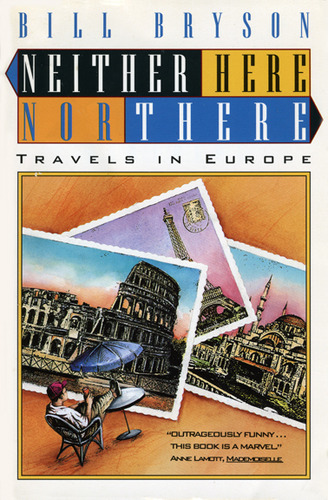
After 20 years as a London-based reporter, American journalist Bryson ( The Mother Tongue ) set out to retrace a youthful European backpacking trip, from arctic Norway’s northern lights to romantic Capri and the “collective delirium” of Istanbul. Descriptions of historic and artistic sights in the Continent’s capitals are cursory; Bryson prefers lesser-known locales, whose peculiar flavor he skillfully conveys in anecdotes that don’t scant the seamy side and often portray eccentric characters encountered during untoward adventures of the road. He enlivens the narrative with keen, sometimes acerbic observations of national quirks like the timed light switches in French hallways, but tends to strive too hard for comic effects, some in dubious taste. He also joins other travelers in deploring the growing hordes of peddlers who overrun major tourist meccas.
Getting Stoned with Savages: A Trip Through the Islands of Fiji and Vanuatu
– J. Maarten Troost
Using a format similar to that of his previous work, The Sex Lives of Cannibals, Troost creates another comical and touching travel memoir. Troost and his wife, Sylvia, move from busy Washington, D.C., to Vanuatu, a nation made up of 83 islands in the South Pacific. As Sylvia works for a regional nonprofit, Troost immerses himself in the islands’ culture, an odd mix of the islanders’ thousand-year-old “kastoms” along with imperialist British and French influences. This really means that Troost gets to live in a nice house while he gets drunk on kava; dodges “a long inferno of magma and a cascade of lava bombs” at the “world’s most accessible volcano”; and checks out the “calcified” leftovers from one of Vanuatu’s not-so-ancient traditions, cannibalism. At the end of the book, the couple move to Fiji so that Sylvia will have state-of-the-art medical care when she gives birth to their first baby. While modern-day Fiji provides little fodder for Troost’s comic sensibilities, the birth of his son enables him to share some deeper thoughts and decide it is “time to stop looking for paradise.” A funny travelogue with a sentimental heart, Troost’s latest work genuinely captures the search for paradise as well as the need for home.
– Sebastian Junger
War is insanely exciting…. Don’t underestimate the power of that revelation, warns bestselling author and Vanity Fair contributing editor Junger (The Perfect Storm). The war in Afghanistan contains brutal trauma but also transcendent purpose in this riveting combat narrative. Junger spent 14 months in 2007–2008 intermittently embedded with a platoon of the 173rd Airborne brigade in Afghanistan’s Korengal Valley, one of the bloodiest corners of the conflict. The soldiers are a scruffy, warped lot, with unkempt uniforms—they sometimes do battle in shorts and flip-flops—and a ritual of administering friendly beatings to new arrivals, but Junger finds them to be superlative soldiers. Junger experiences everything they do—nerve-racking patrols, terrifying roadside bombings and ambushes, stultifying weeks in camp when they long for a firefight to relieve the tedium. Despite the stress and the grief when buddies die, the author finds war to be something of an exalted state: soldiers experience an almost sexual thrill in the excitement of a firefight—a response Junger struggles to understand—and a profound sense of commitment to subordinating their self-interests to the good of the unit. Junger mixes visceral combat scenes—raptly aware of his own fear and exhaustion—with quieter reportage and insightful discussions of the physiology, social psychology, and even genetics of soldiering. The result is an unforgettable portrait of men under fire.
– Rory Stewart
We never really find out why Stewart decided to walk across Afghanistan only a few months after the Taliban were deposed, but what emerges from the last leg of his two-year journey across Asia is a lesson in good travel writing. By turns harrowing and meditative, Stewart’s trek through Afghanistan in the footsteps of the 15th-century emperor Babur is edifying at every step, grounded by his knowledge of local history, politics and dialects. His prose is lean and unsentimental: whether pushing through chest-high snow in the mountains of Hazarajat or through villages still under de facto Taliban control, his descriptions offer a cool assessment of a landscape and a people eviscerated by war, forgotten by time and isolated by geography. The well-oiled apparatus of his writing mimics a dispassionate camera shutter in its precision. But if we are to accompany someone on such a highly personal quest, we want to know who that person is. Unfortunately, Stewart shares little emotional background; the writer’s identity is discerned best by inference. Sometimes we get the sense he cares more for preserving history than for the people who live in it (and for whom historical knowledge would be luxury). But remembering Geraldo Rivera’s gunslinging escapades, perhaps we could use less sap and more clarity about this troubled and fascinating country.
Marching Powder: A True Story of Friendship, Cocaine, and South America’s Strangest Jail
– Thomas McFadden
This memoir of a British drug dealer’s nearly five years inside a Bolivian prison provides a unique window on a bizarre and corrupt world. McFadden, a young black man from Liverpool arrested for smuggling cocaine, finds himself forced to pay for his accommodations in La Paz’s San Pedro Prison, the first of many oddities in a place where some inmates keep pets and rich criminals can sustain a lavish lifestyle. The charismatic McFadden soon learns how to survive, and even thrive, in an atmosphere where crooked prison officials turn up at his private cell to snort lines of coke. By chance, he stumbles on an additional source of income when he begins giving tours of the prison to foreign tourists, a trade that leads to the mention in a Lonely Planet guidebook that attracts the attention of his coauthor, Young, who was backpacking in South America at the time. McFadden’s unapologetic self-serving story will attract little pity as he freely admits to countless cocaine sales for which he was never held accountable. Once the authors chronicle the novel aspects of life in San Pedro, from which McFadden was released in 2000, the narrative loses momentum. The book would have benefited from some judicious editing and some objective perspective on the veracity of McFadden’s story.
The Ministry of Special Cases: A Novel
– Nathan Englander
The novel is set in 1976 in Buenos Aires during Argentina’s “dirty war.” Kaddish Poznan, hijo de puta, son of a whore, earns a meager living defacing gravestones of Jewish whores and pimps whose more respectable children want to erase their immigrant parents’ names and forget their shameful activities. Kaddish labors in the Jewish cemetery at night. His hardworking wife, Lillian, toils in an insurance agency by day, and their idealistic son, Pato, attends college, goes to concerts and smokes pot with his friends. When Pato is taken from home, Kaddish learns what it really means to erase identity, because no one in authority will admit Pato has been arrested. No one will even acknowledge that Pato existed. As Lillian and Kaddish attempt to penetrate the Ministry of Special Cases, Englander’s novel takes on an epic quality in which Jewish parents descend into the underworld and journey through circles of hell. Gogol, I.B. Singer and Orwell all come to mind, but Englander’s book is unique in its layering of Jewish tradition and totalitarian obliteration. At times Englander’s motifs seem forced. Kaddish, whose very name evokes the memory of the dead, chisels out the name of a plastic surgeon’s disreputable father, and in lieu of cash receives nose jobs for himself and his wife. Lillian’s nose job is at first unsuccessful, and her nose slides off her face. One form of defacement pays for another. Kaddish fights with his son in the cemetery and accidentally slices off the tip of Pato’s finger. Attempting to erase a letter, Kaddish blights a digit. But the fight seems staged, Pato’s presence unwarranted except for Englander’s schema. Other scenes are haunting: Lillian confronting bureaucrats; Kaddish appealing to a rabbi to learn if it is possible for a Jew to have a funeral without a body; Kaddish picking an embarrassing embroidered name off the velvet curtain in front of the ark in the synagogue. When he picks off the gold thread, the name stands out even more prominently because the velvet underneath the embroidery is unfaded, darker than the rest of the fabric. Englander writes with increasing power and authority in the second half of his book; he probes deeper and deeper, looking at what absence means, reading the shadow letters on history’s curtain.
Maximum City: Bombay Lost and Found
– Suketu Mehta
Bombay native Mehta fills his kaleidoscopic portrait of “the biggest, fastest, richest city in India” with captivating moments of danger and dismay. Returning to Bombay (now known as Mumbai) from New York after a 21-year absence, Mehta is depressed by his beloved city’s transformation, now swelled to 18 million and choked by pollution. Investigating the city’s bloody 1992–1993 riots, he meets Hindus who massacred Muslims, and their leader, the notorious Godfather-like founder of the Hindu nationalist Shiv Sena party, Bal Thackeray, “the one man most directly responsible for ruining the city I grew up in.” Daring to explore further the violent world of warring Hindu and Muslim gangs, Mehta travels into the city’s labyrinthine criminal underworld with tough top cop Ajay Lal, developing an uneasy familiarity with hit men who display no remorse for their crimes. Mehta likewise deploys a gritty documentary style when he investigates Bombay’s sex industry, profiling an alluring, doomed dancing girl and a cross-dressing male dancer who leads a strange double life. Mehta includes so-called “Bollywood” in his sweeping account of Bombay’s subcultures: he hilariously recounts, in diary style, day-to-day life on the set among the aging male stars of the action movie Mission Kashmir. Mehta, winner of a Whiting Award and an O. Henry Prize, is a gifted stylist. His sophisticated voice conveys postmodern Bombay with a carefully calibrated balance of wit and outrage, harking back to such great Victorian urban chroniclers as Dickens and Mayhew while introducing the reader to much that is truly new and strange.
Motoring with Mohammed: Journeys to Yemen and the Red Sea
– Eric Hansen
In 1978 Eric Hansen found himself shipwrecked on a desert island in the Red Sea. When goat smugglers offered him safe passage to Yemen, he buried seven years’ worth of travel journals deep in the sand and took his place alongside the animals on a leaky boat bound for a country that he’d never planned to visit.
As he tells of the turbulent seas that stranded him on the island and of his efforts to retrieve his buried journals when he returned to Yemen ten years later, Hansen enthralls us with a portrait — uncannily sympathetic and wildly offbeat — of this forgotten corner of the Middle East. With a host of extraordinary characters from his guide, Mohammed, ever on the lookout for one more sheep to squeeze into the back seat of his car, to madcap expatriates and Eritrean gun runners- and with landscapes that include cities of dreamlike architectural splendor, endless sand dunes, and terrifying mountain passes, Hansen reveals the indelible allure of a land steeped in custom, conflicts old and new, and uncommon beauty.
– Gregory David Roberts
At the start of this massive, thrillingly undomesticated potboiler, a young Australian man bearing a false New Zealand passport that gives his name as “Lindsay” flies to Bombay some time in the early ’80s. On his first day there, Lindsay meets the two people who will largely influence his fate in the city. One is a young tour guide, Prabaker, whose gifts include a large smile and an unstoppably joyful heart. Through Prabaker, Lindsay learns Marathi (a language not often spoken by gora, or foreigners), gets to know village India and settles, for a time, in a vast shantytown, operating an illicit free clinic. The second person he meets is Karla, a beautiful Swiss-American woman with sea-green eyes and a circle of expatriate friends. Lin’s love for Karla—and her mysterious inability to love in return—gives the book its central tension. “Linbaba’s” life in the slum abruptly ends when he is arrested without charge and thrown into the hell of Arthur Road Prison. Upon his release, he moves from the slum and begins laundering money and forging passports for one of the heads of the Bombay mafia, guru/sage Abdel Khader Khan. Eventually, he follows Khader as an improbable guerrilla in the war against the Russians in Afghanistan. There he learns about Karla’s connection to Khader and discovers who set him up for arrest. Roberts, who wrote the first drafts of the novel in prison, has poured everything he knows into this book and it shows. It has a heartfelt, cinemascope feel. If there are occasional passages that would make the very angels of purple prose weep, there are also images, plots, characters, philosophical dialogues and mysteries that more than compensate for the novel’s flaws. A sensational read, it might well reproduce its bestselling success in Australia here.
My Wicked Wicked Ways: The Autobiography of Errol Flynn
– Errol Flynn
By the time Errol Flynn got around to the task of putting his incredibly adventurous life on paper, booze, drugs and a life of dissipation had caught up with him. At 50, he was a wasted shadow of the once beautiful, vibrant movie idol who had captured a nation’s imagination in such glorious screen epics as “Captain Blood” and “The Adventures of Robin Hood.” No longer capable of the sustained concentration and commitment necessary to write an autobiography, Putnam and Sons assigned Flynn to a ghost writer by the name of Earl Conrad. Conrad spent many hours interviewing Flynn, and the result is “My Wicked, Wicked Ways.” While the book was not written by Flynn, Conrad tried to duplicate the actor’s unique way of expressing himself so that it was, in a way, spoken with Flynn’s voice. The reader of “My Wicked, Wicked Ways” should be aware that a great deal of its contents has, since its publication, been discovered to be false. Flynn either made things up as he went along — he was a notorious and gifted liar — or he was confused thanks to the two quarts of vodka he tossed down every day of his life, and simply got some things wrong. Whatever the case may be, Errol Flynn did not tell the whole truth and nothing but the truth in “his” autobiography. However, “My Wicked, Wicked Ways” is still a rousing look at a rousing life…at one of the most visually stunning men of his or any other day…at a man who could seemingly generate screen magic without effort…at a man whose demons drove him, at the age of 50, into his grave with the body of an 85-year-old man. For those reasons it is worth reading.
Rule No. 5: No Sex on the Bus: Confessions of a Tour Leader
– Brian Thacker
In this rollicking, absurd ride, Brian Thacker, bus-tour leader extraordinaire, confesses all as he reveals the best (and worst) of more than 20 trips as a tour leader though Europe. He tells how he fed passengers horsemeat spag bog, hamburgers made from breakfast cereal, and roosters’ testicles. He also introduces people to the world of scams, broken rules, terrible blunders, promiscuous locals, and inevitable clashes of cultures when a busful of tourists take on Europe on a four-week tour. Other stories include how he left a passenger standing by the side of a motorway in France for three hours in his underwear clutching a purple toothbrush, and how he lost his driver, his cook, his bus, 10 brightly colored canal bikes, a large church, and eventually his patience. Countries dissected include Belgium, Holland, Germany, Switzerland, Austria, Italy, Spain, and France.
– Thomas Kohnstamm
Invoking Hunter S. Thompson is a risky proposition for young writers, who can be gulled into thinking that chemical intake and sketchy reporting are substitutes for the gonzo great’s keen insight and lacerating wit. Fortunately, although Kohnstamm plays the Thompson card on his first hand, documenting a monumental pub crawl with a coke buddy called “the Doctor,” he soon finds his own voice. Scratching a bite from the travel bug, Kohnstamm walks away from a Wall Street cubicle to accept a poorly paid, impossibly deadlined job updating the Lonely Planet guide to Brazil. Sharp writing and self-deprecating wit add spice to a chronicle of the sometimes absurd world of guidebook writing. (In one memorable scene, he gets thrown out of a hotel he is researching because he looks—accurately—too poor to stay there.) There’s food for thought, too, about Lonely Planet’s journey from backpacker tip sheet to faux-hobo itinerary and the aftereffects of the travel it promotes. Kohnstamm’s hedonism is heroic, but it’s his willingness to think about hedonism’s consequences that makes this worth reading.
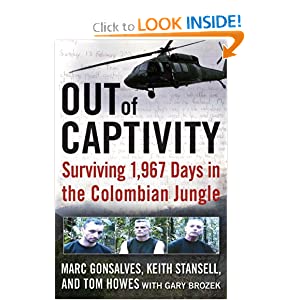
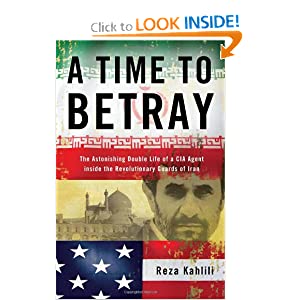


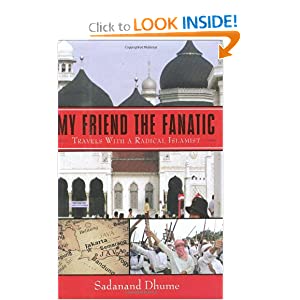
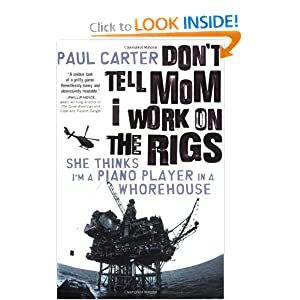
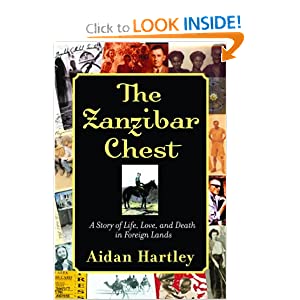
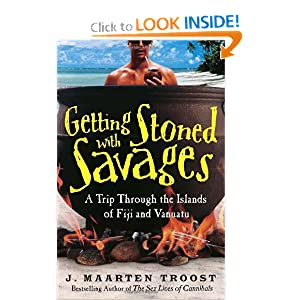

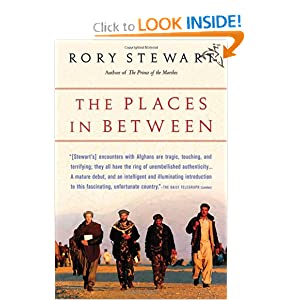
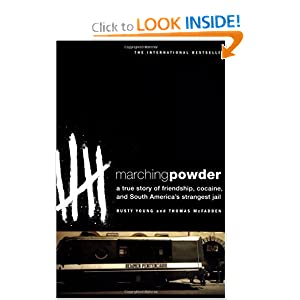
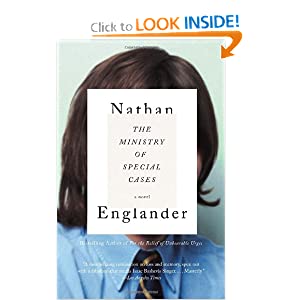
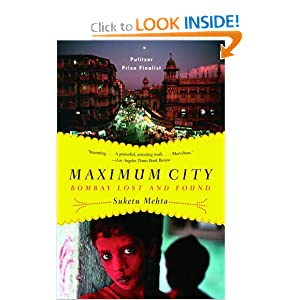
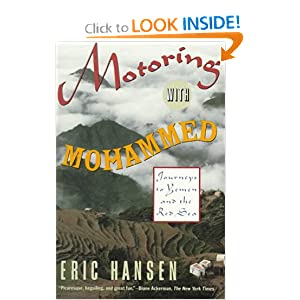
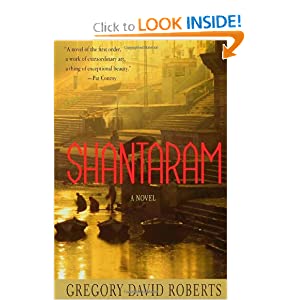
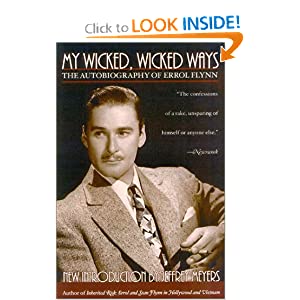
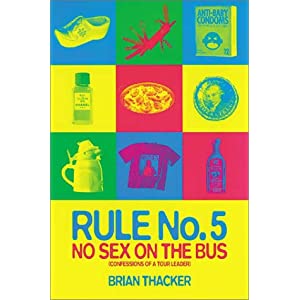
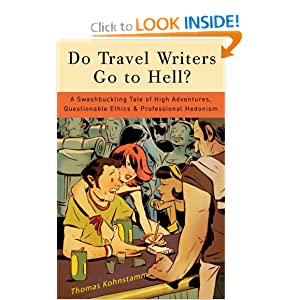
Jeronullet says
Jason-
Thanks for the post! There are quite a few books here that I might end up reading!
Jeremy
Locationless Living says
That great Jeremy. You can’t go wrong with any of those books.